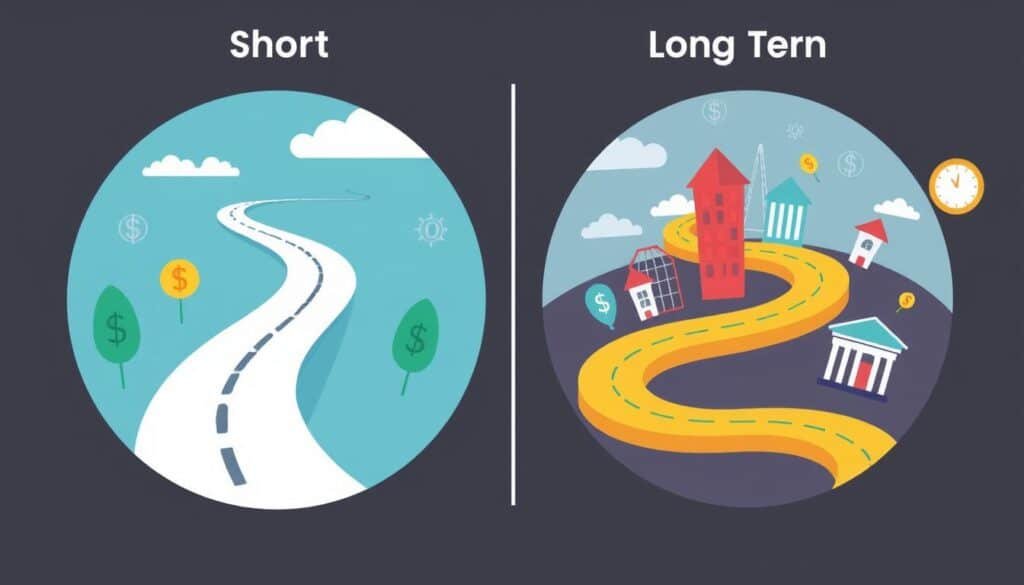Loan terms cover the details of borrowing money. This includes how long you’ll pay it back, the interest rate, any fees, and special rules. Knowing about loan terms is key for borrowers. It helps them understand their responsibilities and if the loan is right for them.
The length of a loan term is how long you’ll repay the loan. This time frame changes based on the loan type and amount. For instance, mortgage terms can last from 10 to 40 years. Auto loans usually last between 24 to 84 months. Personal loans can range from 12 to 60 months.
The loan term greatly affects your monthly payments, the total cost, and your budget. It’s important to consider this when borrowing money.
Key Takeaways
- Loan terms refer to the repayment period, interest rate, fees, and other conditions of a loan agreement.
- The loan term length, or duration, varies by loan type and can significantly impact monthly payments and total borrowing costs.
- Shorter loan terms generally result in higher monthly payments but lower total interest paid over the life of the loan.
- Longer loan terms have lower monthly payments but higher overall interest costs.
- Understanding loan terms is crucial for borrowers to make informed decisions and negotiate favorable financing options.
Understanding the Basics of Loan Terms
When you get a loan, knowing the key parts of the agreement is vital. These terms affect your borrowing experience and the loan’s cost. Let’s look at the main elements of loan terms:
Key Components of Loan Agreements
Loan agreements have several important parts. These include the repayment period, interest rate, fees, and penalties for late or missed payments. The repayment schedule shows how your monthly payments are used. It covers the principal and interest over the loan’s life. Lenders might also ask for collateral or a personal guarantee to secure the loan.
How Loan Terms Affect Your Borrowing
The loan terms you agree to affect your monthly payments and the total interest you pay. Shorter terms, like 15-year mortgages, have higher payments but less total interest. Longer terms, such as 30-year mortgages, have lower payments but more interest over time.
Different Types of Loan Terms
- Short-term loans (less than 1 year): These are for immediate needs, like personal loans or business lines of credit.
- Intermediate-term loans (1-3 years): Used for bigger purchases or investments, like auto loans or equipment financing.
- Long-term loans (3-25 years): For major, long-term financial commitments, such as mortgages and student loans.
When looking at loan options, consider the amortization schedule. It shows how payments are used for the principal and interest over time. Also, be aware of balloon payments and default conditions. Knowing these can help you negotiate better terms with lenders.
The Impact of Loan Term on Monthly Payments

The loan term greatly affects your monthly payments. Longer terms mean lower monthly payments but more interest over time. Shorter terms mean higher payments but less interest in the long run.
A loan calculator can show you how different terms change your payments and total cost. The amortization schedule breaks down your payments into principal and interest. In the beginning, more goes to interest.
| Loan Term | Monthly Payment | Total Interest Paid |
|---|---|---|
| 15-year Loan | $1,012 | $57,216 |
| 30-year Loan | $699 | $151,640 |
The table shows a 15-year loan has a higher monthly payment of $1,012 but less interest, $57,216. A 30-year loan has a lower payment of $699 but more interest, $151,640.
Choosing a loan term depends on your finances and goals. Weighing monthly payments against total interest helps you decide what’s best for you.
Loan Term and Interest Rates: What You Need to Know

When you borrow money, interest rates are key to the loan’s cost. Knowing how loan terms and interest rates work can help you save money in the long run.
Fixed vs. Variable Interest Rates
Loans have either fixed or variable interest rates. Fixed rates stay the same, while variable rates change with the prime rate or LIBOR. People often choose fixed rates for their stability, but variable rates might start lower.
How Term Length Affects Interest Rates
Longer-term loans usually have higher interest rates than shorter-term loans. This is because longer loans are seen as riskier. Lenders worry that borrowers might face financial changes that make repaying harder.
Total Interest Costs Over Different Terms
The loan term greatly influences the total interest you’ll pay. Longer loans mean more interest, but lower monthly payments. Shorter loans have less interest but higher monthly payments.
“Even a small percentage difference can impact the amount of interest you pay on a loan or credit card.”
Choosing the right loan term is important. It affects how much you’ll pay in interest over time.
Common Loan Term Lengths for Different Types of Loans

The length of a loan term varies by type. Mortgage loans usually last from 15 to 30 years, sometimes up to 40 years. Auto loans are shorter, ranging from 24 to 84 months.
Also Read : What Are The Benefits Of Quick Loans For Emergency Needs?
Personal loans have repayment periods from 12 to 60 months. SBA loans can last up to 25 years for real estate and 10 years for working capital. Student loans typically have a 10-year repayment term, but private loans offer different options.
Business loans can be short-term (less than a year) or long-term (up to 25 years). The choice depends on the borrower’s finances, the loan’s purpose, and the lender’s rules. Knowing the typical term lengths helps borrowers choose wisely, fitting their financial goals and needs.
FAQs
Q: What are loan terms and conditions?
A: Loan terms and conditions refer to the specific details associated with a loan agreement, including the length of time for repayment, the interest rate, the loan amount, and any fees or penalties that may apply.
Q: Why is understanding loan terms important when applying for a personal loan?
A: Understanding loan terms is crucial because it helps you evaluate the overall cost of the loan, including loan payments and interest payments, enabling you to make informed financial decisions.
Q: How do loan terms affect monthly payments on a mortgage?
A: The loan term significantly influences your monthly mortgage payments. A longer loan term generally results in lower monthly payments but may increase the total amount of interest paid over the life of the mortgage loan.
Q: Can I negotiate loan terms and conditions with my lender?
A: Yes, many times you may be able to negotiate the terms and conditions involved in your loan, such as the interest rate and repayment period, especially if you have a strong credit score.
Q: What does the term “loan term” mean?
A: The term “loan term” refers to the length of time you have to repay the loan in full, which can vary widely depending on the type of loan, such as a personal loan or a mortgage.
Q: What types of mortgage loan terms are available?
A: There are various types of mortgage loan terms, including 15-year, 20-year, and 30-year terms, each affecting your monthly mortgage payments and the total interest paid over the life of the loan.
Q: How does a longer loan term impact the cost of your loan?
A: A longer loan term generally results in lower monthly installments but increases the total amount of interest paid over time, which can make the overall cost of the loan higher.
Q: What happens if I make a late payment on my loan?
A: Making a late payment can result in fees and could negatively impact your credit score, which may affect your ability to secure future loans.
Q: How can I use a personal loan calculator to determine my loan payments?
A: You can use a personal loan calculator to determine your monthly loan payments by entering the loan amount, interest rate, and loan term, which will help you understand your financial commitment before taking out a loan.
Source Links
- https://www.investopedia.com/terms/t/termloan.asp
- https://www.rocketmortgage.com/learn/loan-term
- https://www.forbes.com/advisor/personal-loans/what-are-loan-terms/




